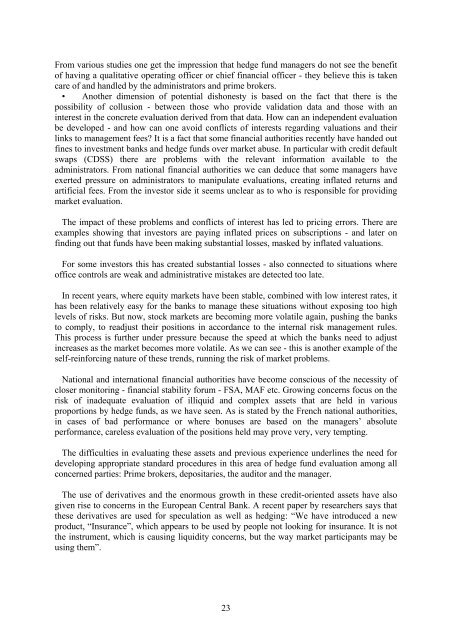Executive summary - Udo Bullmann
Executive summary - Udo Bullmann
Executive summary - Udo Bullmann
- No tags were found...
Create successful ePaper yourself
Turn your PDF publications into a flip-book with our unique Google optimized e-Paper software.
From various studies one get the impression that hedge fund managers do not see the benefitof having a qualitative operating officer or chief financial officer - they believe this is takencare of and handled by the administrators and prime brokers.• Another dimension of potential dishonesty is based on the fact that there is thepossibility of collusion - between those who provide validation data and those with aninterest in the concrete evaluation derived from that data. How can an independent evaluationbe developed - and how can one avoid conflicts of interests regarding valuations and theirlinks to management fees? It is a fact that some financial authorities recently have handed outfines to investment banks and hedge funds over market abuse. In particular with credit defaultswaps (CDSS) there are problems with the relevant information available to theadministrators. From national financial authorities we can deduce that some managers haveexerted pressure on administrators to manipulate evaluations, creating inflated returns andartificial fees. From the investor side it seems unclear as to who is responsible for providingmarket evaluation.The impact of these problems and conflicts of interest has led to pricing errors. There areexamples showing that investors are paying inflated prices on subscriptions - and later onfinding out that funds have been making substantial losses, masked by inflated valuations.For some investors this has created substantial losses - also connected to situations whereoffice controls are weak and administrative mistakes are detected too late.In recent years, where equity markets have been stable, combined with low interest rates, ithas been relatively easy for the banks to manage these situations without exposing too highlevels of risks. But now, stock markets are becoming more volatile again, pushing the banksto comply, to readjust their positions in accordance to the internal risk management rules.This process is further under pressure because the speed at which the banks need to adjustincreases as the market becomes more volatile. As we can see - this is another example of theself-reinforcing nature of these trends, running the risk of market problems.National and international financial authorities have become conscious of the necessity ofcloser monitoring - financial stability forum - FSA, MAF etc. Growing concerns focus on therisk of inadequate evaluation of illiquid and complex assets that are held in variousproportions by hedge funds, as we have seen. As is stated by the French national authorities,in cases of bad performance or where bonuses are based on the managers’ absoluteperformance, careless evaluation of the positions held may prove very, very tempting.The difficulties in evaluating these assets and previous experience underlines the need fordeveloping appropriate standard procedures in this area of hedge fund evaluation among allconcerned parties: Prime brokers, depositaries, the auditor and the manager.The use of derivatives and the enormous growth in these credit-oriented assets have alsogiven rise to concerns in the European Central Bank. A recent paper by researchers says thatthese derivatives are used for speculation as well as hedging: “We have introduced a newproduct, “Insurance”, which appears to be used by people not looking for insurance. It is notthe instrument, which is causing liquidity concerns, but the way market participants may beusing them”.23





